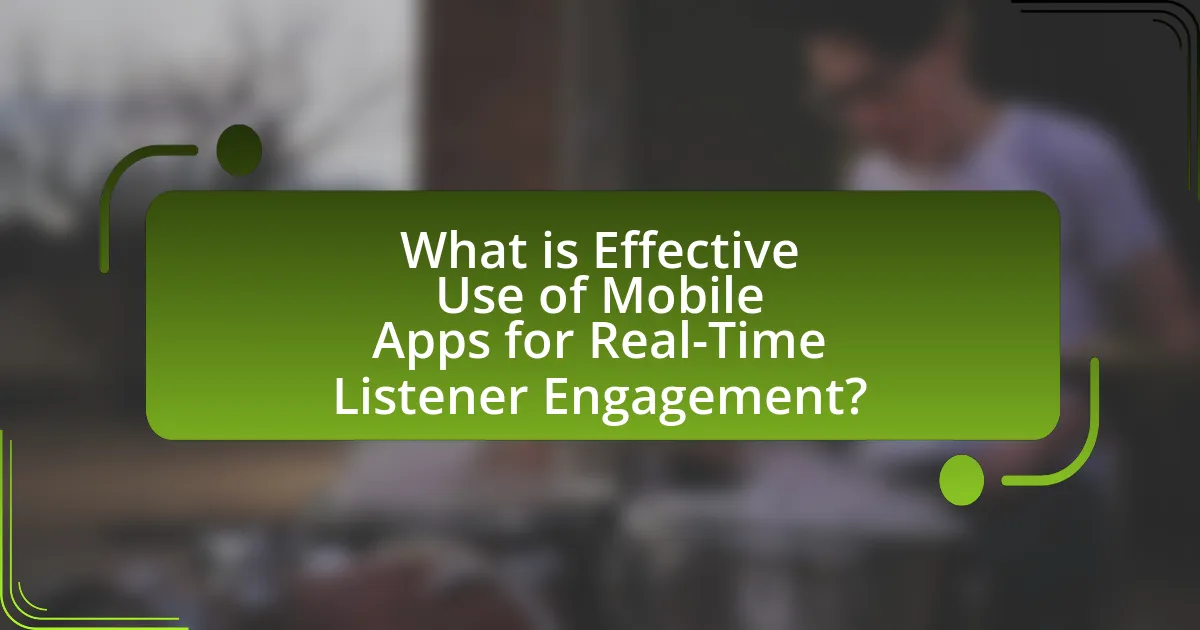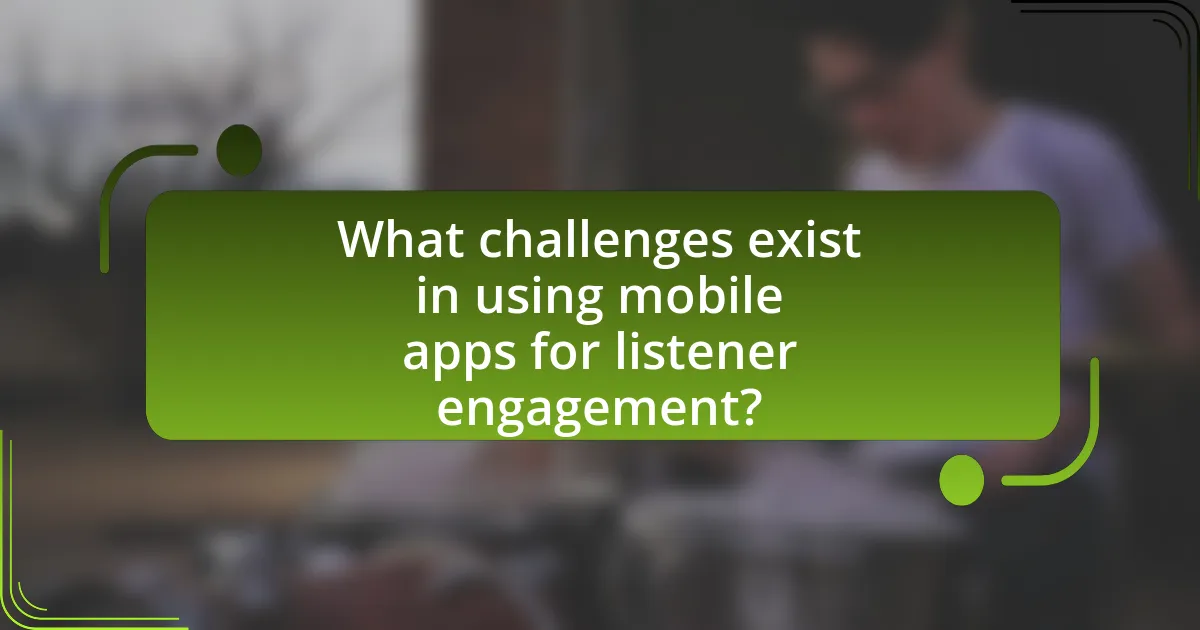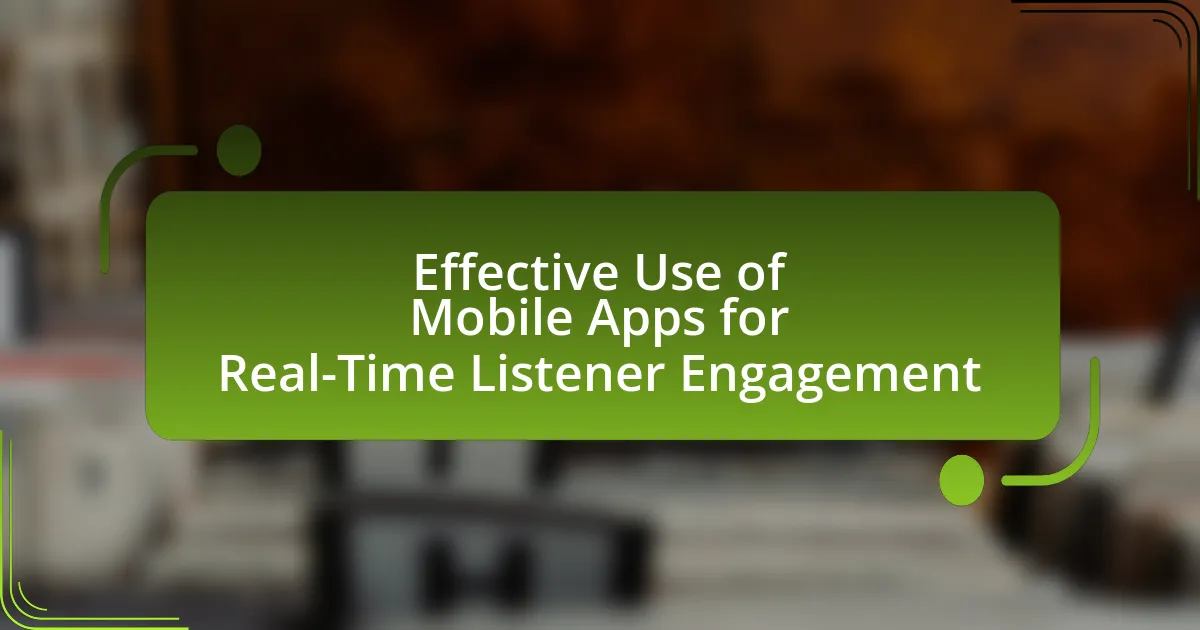The article focuses on the effective use of mobile apps for real-time listener engagement, emphasizing the importance of interactive features such as push notifications, live polling, and real-time chat. It discusses how these functionalities enhance user experience by fostering immediate interaction between content creators and their audience, ultimately leading to increased listener retention and satisfaction. Key strategies for maximizing engagement, including personalized content delivery and social media integration, are outlined, along with the challenges of maintaining user retention and addressing technical issues. Additionally, the article highlights the significance of real-time feedback in content creation and the impact of privacy concerns on user trust.

What is Effective Use of Mobile Apps for Real-Time Listener Engagement?
Effective use of mobile apps for real-time listener engagement involves leveraging features such as push notifications, live polling, and interactive content to foster immediate interaction between content creators and their audience. These functionalities enable creators to capture listener attention instantly, facilitating a two-way communication channel that enhances user experience. For instance, a study by Statista in 2021 indicated that 70% of users prefer apps that allow real-time feedback, demonstrating the demand for interactive engagement. By utilizing these features, mobile apps can significantly increase listener retention and satisfaction, ultimately driving higher engagement rates.
How do mobile apps facilitate real-time listener engagement?
Mobile apps facilitate real-time listener engagement by providing interactive features such as live chat, polls, and notifications. These functionalities allow users to participate actively during broadcasts or events, enhancing their connection to the content and the community. For instance, platforms like Clubhouse and Twitch enable users to engage directly with hosts and other listeners, fostering a sense of immediacy and involvement. Research indicates that real-time interactions can increase user retention and satisfaction, as evidenced by a study from the Journal of Interactive Marketing, which found that 70% of users prefer platforms that offer interactive features during live events.
What features of mobile apps enhance listener interaction?
Mobile apps enhance listener interaction through features such as real-time chat, push notifications, personalized content, and interactive polls. Real-time chat allows listeners to engage directly with hosts or other listeners, fostering a sense of community. Push notifications keep users informed about new content or events, encouraging timely participation. Personalized content, driven by user preferences and behavior, increases relevance and engagement. Interactive polls enable listeners to provide instant feedback or opinions, making them feel involved in the content creation process. These features collectively improve user experience and engagement metrics, as evidenced by studies showing that apps with interactive elements see higher user retention rates.
How do notifications and alerts improve engagement?
Notifications and alerts significantly improve engagement by providing timely and relevant information that prompts user interaction. When users receive notifications about new content, updates, or reminders, they are more likely to return to the app and participate actively. Research indicates that push notifications can increase app engagement by up to 88%, as they serve as direct communication channels that encourage users to take immediate action. This immediate feedback loop fosters a sense of connection and urgency, enhancing overall user experience and retention.
Why is real-time engagement important for listeners?
Real-time engagement is important for listeners because it enhances their experience and fosters a sense of community. Engaging with content as it unfolds allows listeners to participate actively, share their thoughts, and connect with others, which can lead to increased satisfaction and loyalty. Studies show that 70% of listeners prefer interactive content, as it makes them feel more involved and valued. This immediate interaction can also provide instant feedback to creators, enabling them to tailor content to audience preferences effectively.
What impact does real-time engagement have on listener retention?
Real-time engagement significantly enhances listener retention by fostering immediate interaction and connection. Studies indicate that when listeners can participate in live discussions, polls, or Q&A sessions, their sense of involvement increases, leading to longer listening durations. For instance, a report by the Interactive Advertising Bureau found that real-time engagement features can boost listener retention rates by up to 30%, as they create a more immersive experience. This active participation not only keeps listeners engaged but also encourages them to return for future interactions, thereby solidifying their loyalty to the content.
How does real-time feedback influence content creation?
Real-time feedback significantly enhances content creation by allowing creators to adjust their material based on immediate audience reactions. This responsiveness leads to more relevant and engaging content, as creators can identify what resonates with their audience in real-time. For instance, a study by the Pew Research Center found that 72% of content creators who utilized real-time feedback reported improved audience engagement and satisfaction. By integrating tools that facilitate instant feedback, such as polls or comments, creators can refine their approach, ensuring that the content aligns with audience preferences and expectations.

What are the key strategies for effective mobile app engagement?
Key strategies for effective mobile app engagement include personalized user experiences, push notifications, and gamification. Personalized user experiences enhance engagement by tailoring content and features to individual preferences, which can increase user retention rates by up to 30%. Push notifications serve as timely reminders and updates, driving user interaction; studies show that apps utilizing push notifications see a 50% increase in engagement. Gamification incorporates game-like elements, such as rewards and challenges, which can boost user motivation and participation, leading to a 20% increase in daily active users. These strategies collectively foster a more engaging environment, encouraging users to interact with the app consistently.
How can content personalization enhance listener engagement?
Content personalization enhances listener engagement by tailoring audio content to individual preferences and behaviors, leading to increased satisfaction and retention. Personalized recommendations, based on user data such as listening history and preferences, create a more relevant experience that resonates with listeners. Research indicates that personalized content can boost engagement metrics significantly; for instance, a study by McKinsey found that personalization can lead to a 10-30% increase in engagement rates. By delivering content that aligns with listeners’ interests, mobile apps can foster a deeper connection, encouraging users to spend more time interacting with the platform.
What data is used for personalizing listener experiences?
User data is used for personalizing listener experiences, including listening history, preferences, demographic information, and behavioral patterns. Listening history provides insights into the types of content a user enjoys, while preferences indicate specific genres or artists they favor. Demographic information, such as age and location, helps tailor recommendations to relevant cultural contexts. Behavioral patterns, derived from user interactions within the app, further refine personalization by adapting to changes in user habits over time. This data-driven approach enhances user engagement and satisfaction, as evidenced by studies showing that personalized recommendations can increase user retention rates by up to 30%.
How does personalization affect listener satisfaction?
Personalization significantly enhances listener satisfaction by tailoring content to individual preferences and behaviors. When listeners receive recommendations or experiences that align with their interests, they are more likely to engage with the content, leading to increased enjoyment and loyalty. Research indicates that personalized experiences can boost user satisfaction by up to 80%, as users feel more valued and understood. This connection between personalization and satisfaction is supported by studies showing that customized content leads to higher retention rates and more frequent interactions, ultimately fostering a deeper relationship between the listener and the platform.
What role does social media integration play in mobile app engagement?
Social media integration significantly enhances mobile app engagement by facilitating user interaction and content sharing. When mobile apps incorporate social media features, such as sharing options, user authentication, and social feeds, they create a seamless experience that encourages users to engage more frequently. According to a study by Statista, 54% of users are more likely to engage with an app that allows them to share content on social media platforms. This integration not only increases user retention but also expands the app’s reach through social sharing, driving new user acquisition.
How can social sharing features boost listener interaction?
Social sharing features can significantly boost listener interaction by facilitating easy content dissemination and encouraging community engagement. When listeners share content on social media platforms, it increases visibility and attracts new audiences, leading to higher engagement rates. According to a study by the Pew Research Center, 72% of adults use social media, which highlights the potential reach of shared content. Additionally, social sharing fosters a sense of community among listeners, as they can discuss and interact with each other about the content, further enhancing their overall experience and connection to the material.
What are the benefits of community building through social media?
Community building through social media enhances engagement, fosters relationships, and creates a sense of belonging among users. By facilitating real-time interactions, social media platforms allow individuals to connect over shared interests, leading to increased loyalty and support for brands or causes. Research indicates that 70% of consumers feel more connected to a brand when it engages with them on social media, demonstrating the effectiveness of community building in driving customer loyalty and advocacy. Additionally, communities formed on social media can provide valuable feedback and insights, enabling organizations to adapt and improve their offerings based on user input.

What challenges exist in using mobile apps for listener engagement?
Mobile apps face several challenges in listener engagement, primarily including user retention, technical issues, and content relevance. User retention is critical, as studies show that 71% of users abandon apps after just one use, indicating a need for compelling content and features to keep listeners engaged. Technical issues, such as app crashes or slow loading times, can frustrate users and lead to decreased engagement; for instance, a report by Localytics found that 22% of users will abandon an app after a single crash. Lastly, maintaining content relevance is essential, as listeners are more likely to disengage if the content does not align with their interests or preferences, which can be addressed through personalized recommendations and timely updates.
How can technical issues hinder real-time engagement?
Technical issues can significantly hinder real-time engagement by causing disruptions in communication and interaction. For instance, slow internet connections can lead to delays in message delivery, resulting in missed opportunities for immediate feedback. Additionally, software bugs or crashes can prevent users from accessing essential features, thereby limiting their ability to participate actively. Research indicates that 47% of users abandon an app due to performance issues, highlighting the critical impact of technical reliability on user engagement.
What common technical problems do users face?
Users commonly face technical problems such as app crashes, slow performance, connectivity issues, and user interface difficulties. App crashes can occur due to software bugs or compatibility issues with the device’s operating system, affecting user experience. Slow performance often results from insufficient device memory or processing power, leading to frustration during real-time engagement. Connectivity issues, including poor internet access, can disrupt the functionality of mobile apps, making it difficult for users to engage effectively. Lastly, user interface difficulties may arise from complex navigation or unclear instructions, hindering users from utilizing the app’s features efficiently. These problems are frequently reported in user feedback and technical support forums, highlighting their prevalence in mobile app usage.
How can developers address these technical challenges?
Developers can address technical challenges in real-time listener engagement by implementing robust backend infrastructure and optimizing app performance. A strong backend, utilizing cloud services like AWS or Google Cloud, ensures scalability and reliability, allowing apps to handle high user traffic without lag. Additionally, optimizing app performance through efficient coding practices and minimizing resource consumption enhances user experience, which is critical for engagement. Research indicates that apps with faster load times see a 70% increase in user retention, demonstrating the importance of these strategies in overcoming technical hurdles.
What are the privacy concerns related to listener engagement?
Privacy concerns related to listener engagement primarily involve the collection and use of personal data without consent. Mobile apps often track user behavior, preferences, and location, raising issues about data security and unauthorized access. For instance, a study by the Electronic Frontier Foundation highlights that many apps share user data with third parties, which can lead to potential misuse. Additionally, the General Data Protection Regulation (GDPR) mandates strict guidelines on data handling, emphasizing the need for transparency and user control over personal information. These regulations underscore the importance of addressing privacy concerns to maintain user trust and comply with legal standards.
How do data protection regulations affect mobile app functionality?
Data protection regulations significantly impact mobile app functionality by imposing strict guidelines on data collection, storage, and user consent. These regulations, such as the General Data Protection Regulation (GDPR) in Europe, require apps to obtain explicit user consent before processing personal data, which can limit the types of data that can be collected and how it can be used. For instance, apps must provide clear privacy policies and allow users to access, modify, or delete their data, which can complicate app design and functionality. Compliance with these regulations often necessitates additional features, such as consent management tools and enhanced security measures, which can affect the overall user experience and operational efficiency of the app.
What measures can be taken to ensure user privacy?
To ensure user privacy, mobile apps should implement strong data encryption, which protects user information during transmission and storage. Encryption methods like AES (Advanced Encryption Standard) are widely recognized for their effectiveness in safeguarding sensitive data. Additionally, apps must adopt strict data minimization practices, collecting only the information necessary for functionality, thereby reducing the risk of exposure. Regular security audits and compliance with privacy regulations, such as GDPR (General Data Protection Regulation), further enhance user trust and privacy. These measures collectively create a robust framework for protecting user privacy in mobile applications.
What best practices should be followed for maximizing engagement?
To maximize engagement in mobile apps for real-time listener interaction, implement personalized content delivery. Personalization increases user satisfaction and retention, as studies show that 80% of consumers are more likely to engage with brands that offer personalized experiences. Additionally, utilize push notifications strategically to remind users of new content or features, which can boost engagement rates by up to 88% when used effectively. Incorporating interactive features, such as polls or live chats, fosters community and encourages participation, leading to a 30% increase in user interaction. Lastly, analyze user behavior data to continuously refine and optimize the app experience, ensuring it meets the evolving preferences of the audience.
How can user feedback be effectively incorporated into app updates?
User feedback can be effectively incorporated into app updates by systematically collecting, analyzing, and prioritizing user suggestions and issues. This process begins with utilizing in-app feedback tools, surveys, and app store reviews to gather insights directly from users. Once collected, developers should categorize feedback into themes, such as usability, features, and bugs, allowing for a structured analysis. Prioritization can be guided by the frequency of similar feedback and the potential impact on user experience. For instance, a study by UserTesting found that apps that actively integrate user feedback into their development cycle see a 30% increase in user satisfaction. By implementing changes based on this prioritized feedback, developers can ensure that updates align closely with user needs, ultimately enhancing engagement and retention.
What are the key metrics to track for assessing engagement success?
The key metrics to track for assessing engagement success include user retention rate, session duration, active users, and interaction rate. User retention rate measures the percentage of users who continue to use the app over time, indicating long-term engagement. Session duration tracks the average time users spend in the app, reflecting the depth of engagement. Active users, both daily and monthly, provide insight into the app’s reach and ongoing interest. Interaction rate, which includes actions such as clicks, shares, and comments, quantifies user involvement and responsiveness. These metrics collectively offer a comprehensive view of engagement effectiveness in mobile apps.



